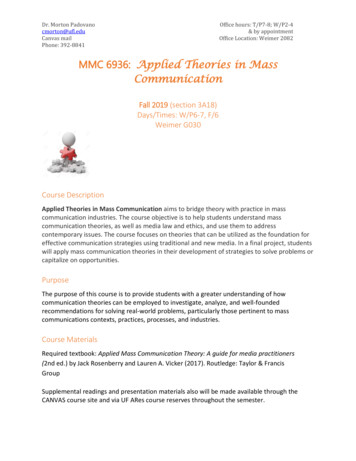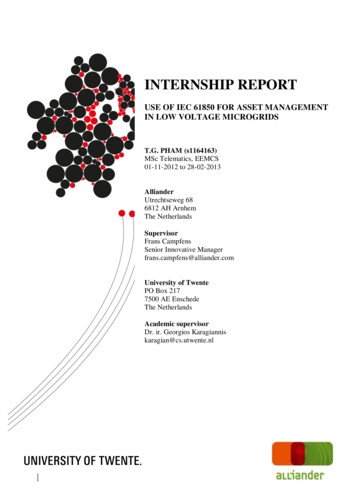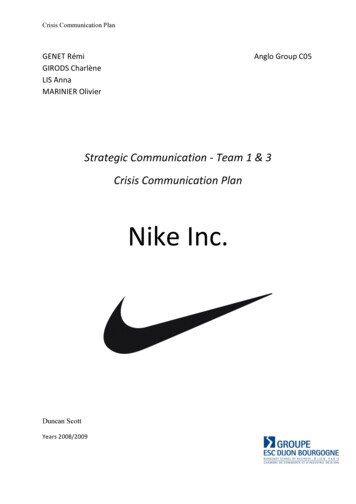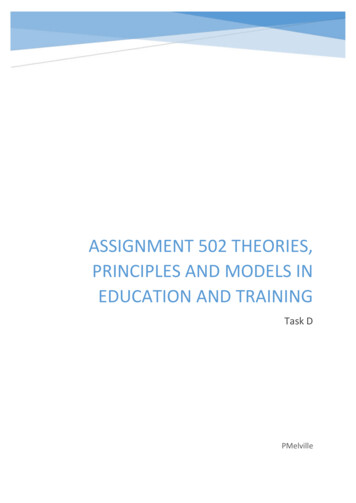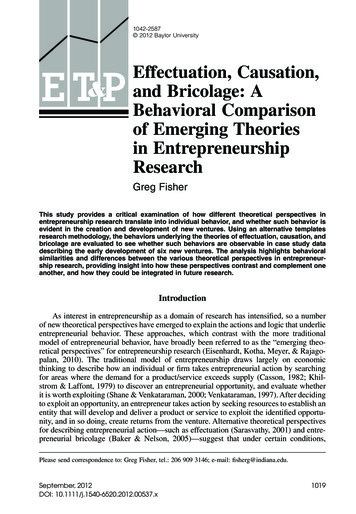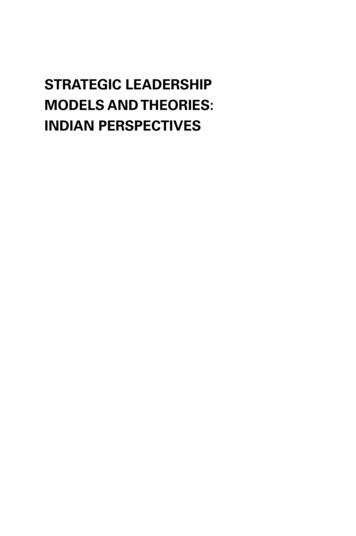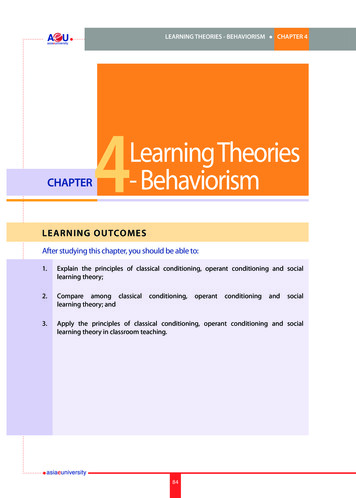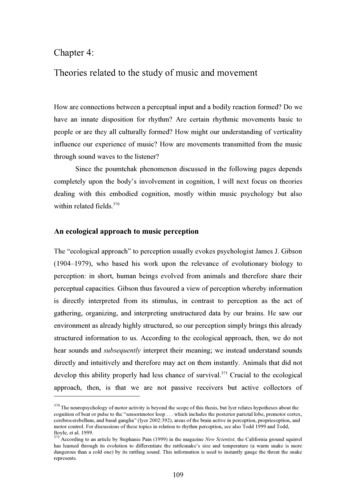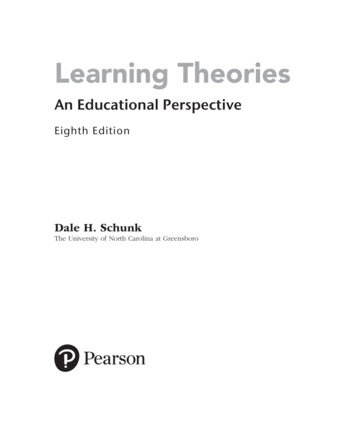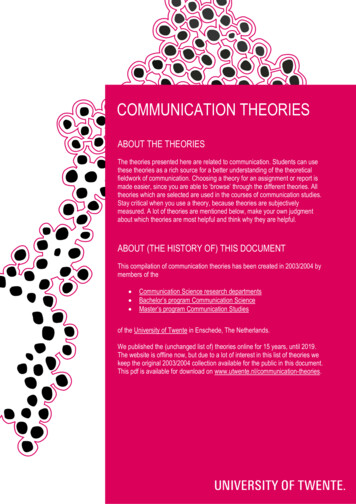
Transcription
COMMUNICATION THEORIESABOUT THE THEORIESThe theories presented here are related to communication. Students can usethese theories as a rich source for a better understanding of the theoreticalfieldwork of communication. Choosing a theory for an assignment or report ismade easier, since you are able to ‘browse’ through the different theories. Alltheories which are selected are used in the courses of communication studies.Stay critical when you use a theory, because theories are subjectivelymeasured. A lot of theories are mentioned below, make your own judgmentabout which theories are most helpful and think why they are helpful.ABOUT (THE HISTORY OF) THIS DOCUMENTThis compilation of communication theories has been created in 2003/2004 bymembers of the Communication Science research departmentsBachelor’s program Communication ScienceMaster’s program Communication Studiesof the University of Twente in Enschede, The Netherlands.We published the (unchanged list of) theories online for 15 years, until 2019.The website is offline now, but due to a lot of interest in this list of theories wekeep the original 2003/2004 collection available for the public in this document.This pdf is available for download on www.utwente.nl/communication-theories.
Contents1. Communication and Information Technology . 41. Adaptive Structuration Theory. 42. Computer Mediated Communication . 73. Contextual Design . 84. Diffusion Of Innovations Theory . 105. Information Theories . 126. Minimalism . 137. Network Theory And Analysis . 158. Reduces Social Cues Approach . 189. Social Identity Model Of Deindivuation Effects . 1910. Social Presence Theory . 1911. Uses And Gratifications Approach . 202. Communication Processes . 221. Framing . 222. Language Expectancy Theory . 233. Model Of Text Comprehension . 254. Network Theory And Analysis . 275. Priming . 316. Psycho-Linguistic Theory . 327. System Theory . 323. Health Communication. 351. Elaboration Likelihood Model . 352. Health Belief Model . 373. Protection Motivation Theory . 404. Social Cognitive Theory . 435. Social Support . 466. Theory Of Planned Behavior/ Reasoned Action . 477. Transactional Model Of Stress And Coping . 504. Interpersonal Communication And Relations . 531. Attribution Theory . 532. Act* Theory . 553. Argumentation Theory . 564. Contagion Theories . 595. Classical Rhetoric . 611
6. Cognitive Dissonance Theory . 637. Elaboration Likelihood Model . 648. Expectancy Value Model . 669. Interpretative And Interaction Theories . 6810. Language Expectancy Theory . 6911. Network Theory And Analysis . 7112. Sensemaking . 7413. Social Identity Theory . 7714. Symbolic Interactionism . 7915. Social Cognitive Theory . 8016. Speech Act . 8317. Theory Of Planned Behavior/ Reasoned Action . 8418. Uncertainty Reduction Theory . 875. Language Theories And Linguistics . 901. Altercasting . 902. Argumenation Theory. 913. Classical Rhetoric . 944. Coordinated Management Of Meaning . 955. Language Expectancy Theory . 976. Model Of Text Comprehension . 997. Psycho-Linguistic Theory . 1018. Speech Act . 1026. Mass Media . 1041. Agenda Setting Theory . 1042. Priming . 1063. Framing . 1074. Cultivation Theory . 1085. Dependency Theory . 1106. Hypodermic Needle Theory . 1137. Knowledge Gap . 1158. Media Richness Theory. 1189. Medium Theory . 12010. Spiral Of Silence . 12111. Two Step Flow Theory . 12312. Uses And Gratifications Approach . 1257. Media, Culture And Society . 1272
1. Altercasting . 1272. Domestication . 1283. Cultivation Theory . 1294. Dependency Theory . 1315. Gatekeeping . 1346. Knowledge Gap . 1367. Medium Theory . 1398. Mental models . 1409. Modernization Theory . 14110. Spiral Of Silence . 1438. Organizational Communication . 1461. Adaptive Structuration Theory. 1462. Attraction-Selection-Attrition Framework . 1493. Competing Values Framework . 1514. Competing Values Framework . 1535. Enactment Theory. 1556. Framing In Organizations. 1577. Groupthink . 1598. Media Richness Theory. 1619. Network Theory And Analysis In Organizations . 16310. Sensemaking .
COMMUNICATION THEORIES ABOUT THE THEORIES The theories presented here are related to communication. Students can use these theories as a rich source for a better understanding of the theoretical fieldwork of communication. Choosing a theory for an assignment or report is made easier, since you are able to ‘browse’ through the different theories. All theories which are selected are used
